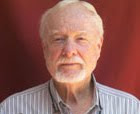Stories I meant to write but didn't. There are others
On 12 November the AP reported that some 2,000 neo-Nazis clashed with police outside Germany’s largest World War II soldier’s cemetery, where the extremists had hoped to stage a demonstration in honor of the Nazi soldiers. Thousands of police were on hand in Halbe to keep the peace between the roughly 2,000 skinheads who had gathered in the town, 30 miles south of Berlin, and the estimated 1,600 counter-demonstrators.
We will write in honor of “Nazi” soldiers,” but not in honor of “German” soldiers. At the same time we will never write about the honor of “Republican or Democratic” soldiers,” but always about “American” soldiers. Underlying this hypocrisy is the obsession with the alleged (and real) “crimes” of the Nazi soldiers, and the obsessive evasion of the (real) crimes of “Democrat and Republican” soldiers in that war.
Jewish pain here, intellectual freedom there
D.D. Guttenplan is the London Correspondent for the Nation, and author of “The Holocaust on Trial” (W.W. Norton, 2001). He is currently writing a biography of I.F. Stone (one of my heroes—BRS). On 19 November the L.A. Times published an article where he argues that David Irving “deserves free speech…”
Further along he writes: “Countries that outlaw Holocaust denial do so not because they love liberty less than we do but because their history is different from ours. Holocaust denial causes real pain to survivors and their families. To fail to acknowledge that pain, or to treat it as a particularly Jewish problem that need not trouble anyone else, is to deny our common humanity - precisely the denier’s aim.”
Like so many of us, Guttenplan commiserates with the “pain” of Jews, but does not consider the “pain” felt by Germans for demonstrably false, yet unending charges of “unique German monstrosity.” Jewish pain is linked with “our common humanity,” while “German pain” is a German problem that need not trouble anyone else.
“As important, in Germany and Austria Holocaust denial is not just hate speech but also a channel for Nazi resurgence, like the Hitler salute and the swastika, which are also banned.”
If Holocaust denial is a “channel for Nazi resurgence,” what do the Guttenplans (for there are an army of them) believe intellectual freedom and the right to free inquiry are channels for? Trips to the moon?
Guttenplan writes: Whatever their motives, the Austrians have every right to deny Irving a platform, even to deport him.
Why do they have every right to deny an independent historian the right to express his views about history? And then there is the primary issue, which Guttenplan does not want to comment on: do the Austrians have “every right” to imprison dissident scholars? Like in Saudi Arabia, or Zimbabwe perhaps? Guttenplan is evasive here, unwilling to choose between “Jewish pain,” and the great ideal of Western culture—intellectual freedom.
There is nothing unusual in this. In America the intellectuals, and particularly a sissy professorial class, are in wide agreement that the problem of Jewish pain is more important that the right to free inquiry and a free press.
Thanksgiving
There are other stories I should comment on here, but its Thanksgiving and our daughter and son-in-law are here and, well, pleasure before business.


2 Comments:
Hello, I would like to ask you a few questions.
I have read some revisionist work, most memorably The Hoax of the Twentieth Century by Arthur Butz.
I have concluded that at best, the Holocaust is a greatly exagerated story, at worst a deliberate lie. I think that the truth is probably somewhere in the middle.
I would like to know your opinions on Adolph Hitler, the Nazi Party, and Germany as a whole.
Do you think that Hitler was a racist?
Do you believe that the Nazi Party was "evil"?
Do you believe that Germany was forced into WWII?
I could ask lots more questions - but if you have some time - i would love to learn what your opinions are.
Thank you for your time.
Not that it matters very much, but in my view:
Yes, Hitler was a racist.
No, the Nazi party was not evil and did not do very much that Republicans and Democrats did not do during WWII.
I don't know if Germany was forced into WWII or not. I doubt it. But that can be answered in any number of ways depending on such subjective matters as your view of world history, etc., etc.
I don't argue any of these matters but urge the academic class to encourage an enviornment on campus, and thus in the culture, where such issues can be argued in open debate, in an environement of good will. For the professors, this appears to be impossible at this point in time. But then, when the chips are down, it's always the wrong time for the professors.
Post a Comment
<< Home